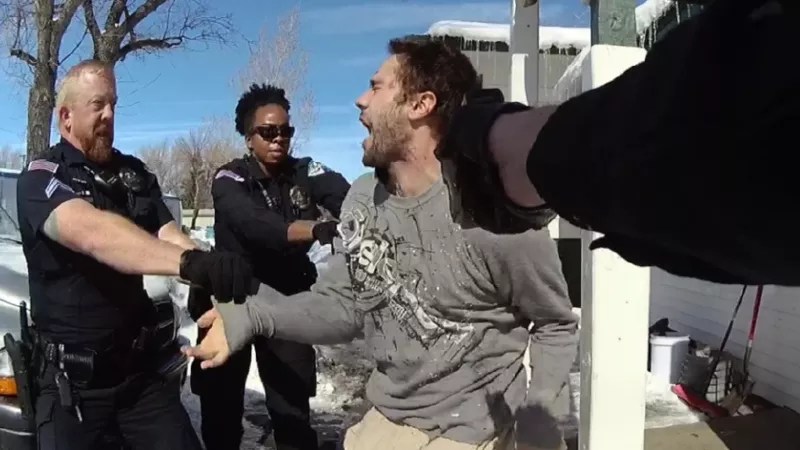
Craig Police Department via Holland, Holland Edwards & Grossman, P.C.

Audio By Carbonatix
Craig resident Grayson Dennis was in the midst of a mental health crisis when he asked police for assistance. But the officers sent to the scene wound up tasing him repeatedly, including while he was handcuffed, even though they knew from an extended conversation conducted moments earlier that he was unarmed and a danger to no one but himself.
The jolts, captured in body-worn camera video, sent Dennis into acute respiratory failure that required him to be rushed to a hospital more than 100 miles away in a flight-for-life helicopter.
These are among the claims made against Craig Police officers Joshua Lyons, Grant Laehr and Daron Hashir in a new lawsuit filed on Dennis’s behalf by Denver-based Holland, Holland Edwards & Grossman, P.C., the firm behind a tragic nursing-home complaint detailed by Westword earlier this month.
According to attorney John Holland, who’s representing Dennis in conjunction with attorney Rachel Kennedy, “Grayson is a young man who was having a really bad day – who was feeling depressed and made an attempt to end his life, then thought better of it and called for help. The officers knew what they were getting into, what kind of call they were responding to. But they responded with callousness and brutality.”
Holland doesn’t know if the officers were disciplined in any way for their actions, but he doubts it, since a supervisor seen toward the end of the video compliments them on their conduct.
Craig City Attorney Heather Cannon declined to comment about the lawsuit “based upon pending litigation.”
The incident took place on February 18. After calling for help, according to the lawsuit, Dennis had fallen asleep and was in bed next to his girlfriend when the officers arrived. After waking, Dennis told them that “he had been having breakdowns, hearing voices, wanted to hurt himself, and that he had taken ‘a lot of different things’ in an attempt to kill himself that day.” His girlfriend’s list of items he’d ingested included an “unknown amount of Benadryl, Xanax, and Cyanide.” She added that “he hadn’t slept for days because he was ‘having a problem with meth,'” and his lethargic nature and slurred speech strongly suggested that he remained under the influence of the assorted substances.
“They spent twenty minutes in the bedroom with him,” Holland points out. “They talked with him about his crisis and they knew all the things she said before these events. But as they were escorting him out of the house, he said he wanted to talk to his dad and his girlfriend, and when they told him they were in the ambulance, he didn’t believe it. And the next thing you know, it turned into a police melee.”
At around the 24:45 mark in the video, Dennis can be seen grabbing onto a support of the home’s porch. “I’m being fucked up right now,” he says as the officers place hands on him. Shortly thereafter, Lyons barks, “Taser! Taser! Taser! Taser!” and fires probes into Dennis’s chest. Several more tasings follow, including after Dennis’s hands have been cuffed.
Here’s the clip:
“It was an entirely inappropriate and cruel way to respond to somebody asking for help who wasn’t suspected of any crime, who wasn’t posing any danger or threat to the officers or anybody else in the vicinity, who was in his own home, who was unarmed, and who they knew was under the influence of drugs,” Kennedy says. “They tased him when he attempted to go back inside his home, and then tased him another three or four times.”
She adds, “He’s a small guy, and there were three officers and at least two paramedics on the scene. But instead of doing what they’d been trained to do, using calm voices and using trusted family members to calm the situation so they could get him the help he requested, they just unconscionably escalated things and tased him over and over again.”
Tasers are frequently described as less-than-lethal weapons, but they can still kill (see this 2018 Westword feature), and Kennedy notes that Axon, the manufacturer of the devices deployed against Dennis, “expressly warns law enforcement not to tase people in the heart, and especially not when they’re restrained or in a mental health crisis…and also that tasing a person multiple times can have a cumulative health effect. It gets exponentially more dangerous to tase somebody a second, third and fourth time.”
This is hardly the first accusation that Colorado law enforcement has used excessive force against an individual in crisis. In October 2019, for instance, the City of Thornton agreed to pay $1.25 million to the estate of Jaime Ceballos, who was killed by police officers during just such an episode; his only weapon was a baseball bat. Holland, Holland Edwards & Grossman P.C. handled that case, too.
Dennis “is still assessing the long-term effect this has had on him,” Kennedy says. “But he’s articulated really well a shift in his feeling that the police are trustworthy. Throughout his life, he’s been a big supporter of the police. He made regular donations to various police causes in different states. But now he’s lost all faith in the police and feels at sea. He’s wondering, ‘Who can I turn to when I’m in a really bad crisis? Who can help me now?'”
Holland adds: “To be blunt, the police ran completely amok. They were supposed to be helping, and they only understood violence.”
Click to read Grayson Dennis v. Joshua Lyons, et al., the Craig Police Department policy manual, and the taser-use guidelines.